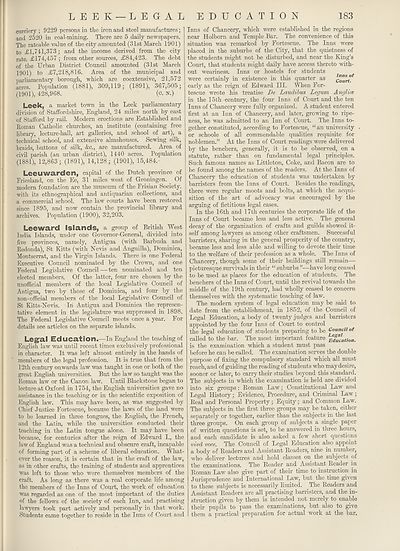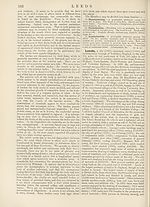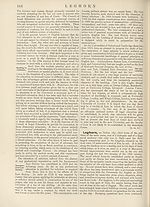New volumes of the Encyclopædia Britannica > Volume 30, K-MOR
(207) Page 183
Download files
Complete book:
Individual page:
Thumbnail gallery: Grid view | List view

LEEK — LEGAL EDUCATION 183
curriery ; 9229 persons in the iron and steel manufactures;
and 2520 in coal-mining. There are 5 daily newspapers.
The rateable value of the city amounted (31st March 1901)
to £1,HI,373; and the income derived from the city
rate, £174,457 ; from other sources, £84,423. The debt
of the Urban District Council amounted (31st March
1901) to £7,218,816. Area of the municipal and
parliamentary borough, which are coextensive, 21,572
acres. Population (1881), 309,119; (1891), 367,505;
(1901), 428,968. (c. n.)
Leek, a market town in the Leek parliamentary
division of Staffordshire, England, 24 miles north by east
of Stafford by rail. Modern erections are Established and
Roman Catholic churches, an institute (containing free
library, lecture-hall, art galleries, and school of art), a
technical school, and extensive almshouses. Sewing silk,
braids, buttons of silk, etc., are manufactured. Area of
civil parish (an urban district), 1440 acres. Population
(1881), 12,863 ; (1891), 14,128; (1901), 15,484.'
Leeuwarden, capital of the Dutch province of
Friesland, on the Ee, 31 miles west of Groningen. Of
modern foundation are the museum of the Frisian Society,
with its ethnographical and antiquarian collections, and
a commercial school. The law courts have been restored
since 1895, and now contain the provincial library and
archives. Population (1900), 32,203.
Leeward Islands, a group of British West
India Islands, under one Governor-General, divided into
five provinces, namely, Antigua (with Barbuda and
Redonda), St Kitts (with Nevis and Anguilla), Dominica,
Montserrat, and the Virgin Islands. There is one Federal
Executive Council nominated by the Crown, and one
Federal Legislative Council — ten nominated and ten
elected members. Of the latter, four are chosen by the
unofficial members of the local Legislative Council of
Antigua, two by those of Dominica, and four by the
non-official members of the local Legislative Council of
St Kitts-Nevis. In Antigua and Dominica the represen¬
tative element in the legislature was suppressed in 1898.
The Federal Legislative Council meets once a year. For
details see articles on the separate islands.
Legal Education.—In England the teaching of
English law was until recent times exclusively professional
in character. It was left almost entirely in the hands of
members of the legal profession. It is true that from the
12th century onwards law was taught in one or both of the
great English universities. But the law so taught was the
Roman law or the Canon law. Until Blackstone began to
lecture at Oxford in 1754, the English universities gave no
assistance in the teaching or in the scientific exposition of
English law. This may have been, as was suggested by
Chief Justice Fortescue, because the laws of the land were
to be learned in three tongues, the English, the French,
and the Latin, while the universities conducted their
teaching in the Latin tongue alone. It may have been
because, for centuries after the reign of Edward I., the
law of England was a technical and obscure craft, incapable
of forming part of a scheme of liberal education. What¬
ever the reason, it is certain that in the craft of the law,
as in other crafts, the training of students and apprentices
was left to those who were themselves members of the
craft. As long as there was a real corporate life among
the members of the Inns of Court, the work of education
was regarded as one of the most important of the duties
of the fellows of the society of each Inn, and practising
lawyers took part actively and personally in that work.
Students came together to reside in the Inns of Court and
Inns of Chancery, which were established in the regions
near Holborn and Temple Bar. The convenience of this
situation was remarked by Fortescue. The Inns were
placed in the suburbs of the City, that the quietness of
the students might not be disturbed, and near the King’s
Court, that students might daily have access thereto with¬
out weariness. Inns or hostels for students ^ ^
were certainly in existence in this quarter as court?
early as the reign of Edward III. When For¬
tescue wrote his treatise De Laudibus Legum Anglice
in the 15th century, the four Inns of Court and the ten
Inns of Chancery were fully organized. A student entered
first at an Inn of Chancery, and later, growing to ripe¬
ness, he was admitted to an Inn of Court. The Inns to¬
gether constituted, according to Fortescue, “an university
or schoole of all commendable qualities requisite for
noblemen.” At the Inns of Court readings were delivered
by the benchers, generally, it is to be observed, on a
statute, rather than on fundamental legal principles.
Such famous names as Littleton, Coke, and Bacon are to
be found among the names of the readers. At the Inns of
Chancery the education of students was undertaken by
barristers from the Inns of Court. Besides the readings,
there were regular moots and bolts, at which the acqui¬
sition of the art of advocacy was encouraged by the
arguing of fictitious legal cases.
In the 16th and 17th centuries the corporate life of the
Inns of Court became less and less active. The general
decay of the organization of crafts and guilds showed it¬
self among lawyers as among other craftsmen. Successful
barristers, sharing in the general prosperity of the country,
became less and less able and willing to devote their time
to the welfare of their profession as a whole. The Inns of
Chancery, though some of their buildings still remain—
picturesque survivals in their “ suburbs ”—have long ceased
to be used as places for the education of students. The
benchers of the Inns of Court, until the revival towards the
middle of the 19th century, had wholly ceased to concern
themselves with the systematic teaching of law.
The modern system of legal education may be said to
date from the establishment, in 1852, of the Council of
Legal Education, a body of twenty judges and barristers
appointed by the four Inns of Court to control
the legal education of students preparing to be Council of
called to the bar. The most important feature Education.
is the examination which a student must pass
before he can be called. The examination serves the double
purpose of fixing the compulsory standard which all must
reach, and of guiding the reading of students who may desire,
sooner or later, to carry their studies beyond this standard.
The subjects in which the examination is held are divided
into six groups : Roman Law; Constitutional Law and
Legal History; Evidence, Procedure, and Criminal Law ;
Real and Personal Property; Equity; and Common Law.
The subjects in the first three groups may be taken, either
separately or together, earlier than the subjects in the last
three groups. On each group of subjects a single paper
of written questions is set, to be answered in three hours,
and each candidate is also asked a few short questions
vivd voce. The Council of Legal Education also appoint
a body of Readers and Assistant Readers, nine in number,
who deliver lectures and hold classes on the subjects of
the examinations. The Reader and Assistant Reader in
Roman Law also give part of their time to instruction in
Jurisprudence and International Law, but the time given
to these subjects is necessarily limited. The Readers and
Assistant Readers are all practising barristers, and the in¬
struction given by them is intended not merely to enable
their pupils to pass the examinations, but also to give
them a practical preparation for actual work at the bar.
curriery ; 9229 persons in the iron and steel manufactures;
and 2520 in coal-mining. There are 5 daily newspapers.
The rateable value of the city amounted (31st March 1901)
to £1,HI,373; and the income derived from the city
rate, £174,457 ; from other sources, £84,423. The debt
of the Urban District Council amounted (31st March
1901) to £7,218,816. Area of the municipal and
parliamentary borough, which are coextensive, 21,572
acres. Population (1881), 309,119; (1891), 367,505;
(1901), 428,968. (c. n.)
Leek, a market town in the Leek parliamentary
division of Staffordshire, England, 24 miles north by east
of Stafford by rail. Modern erections are Established and
Roman Catholic churches, an institute (containing free
library, lecture-hall, art galleries, and school of art), a
technical school, and extensive almshouses. Sewing silk,
braids, buttons of silk, etc., are manufactured. Area of
civil parish (an urban district), 1440 acres. Population
(1881), 12,863 ; (1891), 14,128; (1901), 15,484.'
Leeuwarden, capital of the Dutch province of
Friesland, on the Ee, 31 miles west of Groningen. Of
modern foundation are the museum of the Frisian Society,
with its ethnographical and antiquarian collections, and
a commercial school. The law courts have been restored
since 1895, and now contain the provincial library and
archives. Population (1900), 32,203.
Leeward Islands, a group of British West
India Islands, under one Governor-General, divided into
five provinces, namely, Antigua (with Barbuda and
Redonda), St Kitts (with Nevis and Anguilla), Dominica,
Montserrat, and the Virgin Islands. There is one Federal
Executive Council nominated by the Crown, and one
Federal Legislative Council — ten nominated and ten
elected members. Of the latter, four are chosen by the
unofficial members of the local Legislative Council of
Antigua, two by those of Dominica, and four by the
non-official members of the local Legislative Council of
St Kitts-Nevis. In Antigua and Dominica the represen¬
tative element in the legislature was suppressed in 1898.
The Federal Legislative Council meets once a year. For
details see articles on the separate islands.
Legal Education.—In England the teaching of
English law was until recent times exclusively professional
in character. It was left almost entirely in the hands of
members of the legal profession. It is true that from the
12th century onwards law was taught in one or both of the
great English universities. But the law so taught was the
Roman law or the Canon law. Until Blackstone began to
lecture at Oxford in 1754, the English universities gave no
assistance in the teaching or in the scientific exposition of
English law. This may have been, as was suggested by
Chief Justice Fortescue, because the laws of the land were
to be learned in three tongues, the English, the French,
and the Latin, while the universities conducted their
teaching in the Latin tongue alone. It may have been
because, for centuries after the reign of Edward I., the
law of England was a technical and obscure craft, incapable
of forming part of a scheme of liberal education. What¬
ever the reason, it is certain that in the craft of the law,
as in other crafts, the training of students and apprentices
was left to those who were themselves members of the
craft. As long as there was a real corporate life among
the members of the Inns of Court, the work of education
was regarded as one of the most important of the duties
of the fellows of the society of each Inn, and practising
lawyers took part actively and personally in that work.
Students came together to reside in the Inns of Court and
Inns of Chancery, which were established in the regions
near Holborn and Temple Bar. The convenience of this
situation was remarked by Fortescue. The Inns were
placed in the suburbs of the City, that the quietness of
the students might not be disturbed, and near the King’s
Court, that students might daily have access thereto with¬
out weariness. Inns or hostels for students ^ ^
were certainly in existence in this quarter as court?
early as the reign of Edward III. When For¬
tescue wrote his treatise De Laudibus Legum Anglice
in the 15th century, the four Inns of Court and the ten
Inns of Chancery were fully organized. A student entered
first at an Inn of Chancery, and later, growing to ripe¬
ness, he was admitted to an Inn of Court. The Inns to¬
gether constituted, according to Fortescue, “an university
or schoole of all commendable qualities requisite for
noblemen.” At the Inns of Court readings were delivered
by the benchers, generally, it is to be observed, on a
statute, rather than on fundamental legal principles.
Such famous names as Littleton, Coke, and Bacon are to
be found among the names of the readers. At the Inns of
Chancery the education of students was undertaken by
barristers from the Inns of Court. Besides the readings,
there were regular moots and bolts, at which the acqui¬
sition of the art of advocacy was encouraged by the
arguing of fictitious legal cases.
In the 16th and 17th centuries the corporate life of the
Inns of Court became less and less active. The general
decay of the organization of crafts and guilds showed it¬
self among lawyers as among other craftsmen. Successful
barristers, sharing in the general prosperity of the country,
became less and less able and willing to devote their time
to the welfare of their profession as a whole. The Inns of
Chancery, though some of their buildings still remain—
picturesque survivals in their “ suburbs ”—have long ceased
to be used as places for the education of students. The
benchers of the Inns of Court, until the revival towards the
middle of the 19th century, had wholly ceased to concern
themselves with the systematic teaching of law.
The modern system of legal education may be said to
date from the establishment, in 1852, of the Council of
Legal Education, a body of twenty judges and barristers
appointed by the four Inns of Court to control
the legal education of students preparing to be Council of
called to the bar. The most important feature Education.
is the examination which a student must pass
before he can be called. The examination serves the double
purpose of fixing the compulsory standard which all must
reach, and of guiding the reading of students who may desire,
sooner or later, to carry their studies beyond this standard.
The subjects in which the examination is held are divided
into six groups : Roman Law; Constitutional Law and
Legal History; Evidence, Procedure, and Criminal Law ;
Real and Personal Property; Equity; and Common Law.
The subjects in the first three groups may be taken, either
separately or together, earlier than the subjects in the last
three groups. On each group of subjects a single paper
of written questions is set, to be answered in three hours,
and each candidate is also asked a few short questions
vivd voce. The Council of Legal Education also appoint
a body of Readers and Assistant Readers, nine in number,
who deliver lectures and hold classes on the subjects of
the examinations. The Reader and Assistant Reader in
Roman Law also give part of their time to instruction in
Jurisprudence and International Law, but the time given
to these subjects is necessarily limited. The Readers and
Assistant Readers are all practising barristers, and the in¬
struction given by them is intended not merely to enable
their pupils to pass the examinations, but also to give
them a practical preparation for actual work at the bar.
Set display mode to:
![]() Universal Viewer |
Universal Viewer | ![]() Mirador |
Large image | Transcription
Mirador |
Large image | Transcription
Images and transcriptions on this page, including medium image downloads, may be used under the Creative Commons Attribution 4.0 International Licence unless otherwise stated. ![]()
| Encyclopaedia Britannica > New volumes of the Encyclopædia Britannica > Volume 30, K-MOR > (207) Page 183 |
|---|
| Permanent URL | https://digital.nls.uk/193570192 |
|---|
| Attribution and copyright: |
|
|---|---|
| Shelfmark | EB.18 |
|---|---|
| Description | Ten editions of 'Encyclopaedia Britannica', issued from 1768-1903, in 231 volumes. Originally issued in 100 weekly parts (3 volumes) between 1768 and 1771 by publishers: Colin Macfarquhar and Andrew Bell (Edinburgh); editor: William Smellie: engraver: Andrew Bell. Expanded editions in the 19th century featured more volumes and contributions from leading experts in their fields. Managed and published in Edinburgh up to the 9th edition (25 volumes, from 1875-1889); the 10th edition (1902-1903) re-issued the 9th edition, with 11 supplementary volumes. |
|---|---|
| Additional NLS resources: |
|

